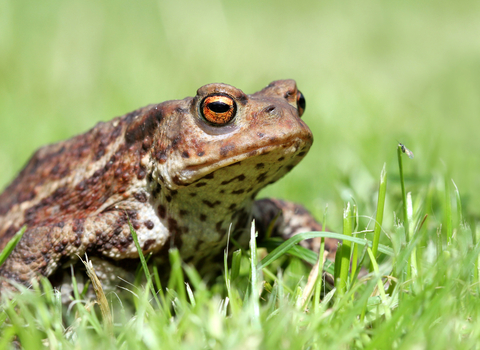
©Jon Hawkins Surrey Hills Photography
Common toad
Despite its warts and ancient associations with witches, the common toad is a gardener's friend, sucking up slugs and snails. It is famous for migrating en masse to its breeding ponds.
Scientific name
Bufo bufoWhen to see
February to OctoberSpecies information
Statistics
Length: 8-13cmWeight: up to 80g
Average lifespan: up to 4 years
Protected in the UK under the Wildlife and Countryside Act, 1981. Priority Species under the UK Post-2010 Biodiversity Framework.
About
Common toads are amphibians, breeding in ponds during the spring and spending much of the rest of the year feeding in woodland, gardens, hedgerows and tussocky grassland. They hibernate over winter, often under log piles, stones or even in old flower pots!Toads are famous for their mass migrations back to their breeding ponds on the first warm, damp evenings of the year, often around St. Valentine's Day. Common toads tend to breed in larger, deeper ponds than common frogs. Toad tadpoles contain toxins that make them unpleasant for predators to eat, allowing them to survive in deep ponds containing fish, which would eat the tadpoles of frogs. Adult toads also contain these toxins, stored in their skin glands.
Common toads mainly feed on slugs, snails and other invertebrates, but larger toads have been known to eat small slow worms and grass snakes, and even harvest mice.
How to identify
The common toad has olive-brown, warty skin, copper eyes and short back legs. It walks rather than hops, and lays its spawn in long strings around aquatic plants, with two rows of eggs per string.Distribution
Found almost everywhere, except for Scottish islands, Northern Ireland, the Isle of Man, the Isles of Scilly and most of the Channel Islands.Did you know?
Our cities and towns pose a threat to common toads; busy roads often block migration paths, making it difficult for them to reach their breeding ponds. It is estimated that 20 tonnes of unlucky toads are killed on the UK’s roads every year. If more than 1,000 toads are known to hop across a road in a particular spot, it is dubbed a 'toad crossing'. On suitable nights for migration, volunteer groups (known as 'toad patrols') gather at these spots to help the toads safely across the road.Watch
Common toad (https://vimeo.com/646959036)
Tom Hibbert
